Topics
- Article
- App & Features
WHOOP Partners with PNOE for Most Accurate, Personalized Health-Monitoring Wearable

Coming soon to WHOOP: The first cardio-metabolic analyzer for all, which can use the snapshot to provide highly personalized customization to your continuous WHOOP data collection.
Imagine a test that could offer you the most comprehensive snapshot of human physiology in just 10 minutes. A test that could scan accurately and non-invasively the health of all essential vital functions including your heart, lungs and cells. In addition, you’d receive all the information needed to build the most personalized nutrition and workout plan comprised of your daily caloric burn, fat and carbohydrate utilization, and training zones thresholds. This test exists and it’s called cardio-metabolic analysis. It involves testing a person’s oxygen consumption and carbon dioxide production at rest and during exercise. And soon, it will be available to all WHOOP members thanks to PNOE, the first cardio-metabolic analyzer for all, which can use the snapshot to provide highly personalized customization to your continuous WHOOP data collection.
What is cardio-metabolic analysis?
Cardio-metabolic analysis applies to many areas of health and wellness:
- Sports: Commonly known as VO2 max, it can measure a person’s peak oxygen consumption, prescribe training zones, and determine workout programs.
- Dietetics: Referred to as metabolic testing in this field, it can assess caloric consumption and fat and carbohydrate oxidation, and provide a foundation for building nutrition plans for weight loss.
- Medicine: Known as cardio-pulmonary exercise testing, it is the most accurate non-invasive way to detect the presence of cardiovascular disease and identify whether dyspnea and chest pain are due to a heart or lung problem.
Despite its well-established benefits, very few athletes, coaches and health practitioners have access to it, and even fewer know how to fully utilize it. Why? It’s expensive, the equipment is difficult to operate, and it can be hard to understand the raw data. PNOE changed that through the world’s first portable, affordable and highly accurate metabolic analyzer that allows anyone to effectively implement cardio-metabolic analysis in their gym or practice. However, despite how accurate a PNOE snapshot is, it only paints part of the picture as 100% accurate fitness programming requires 24/7 monitoring of a person’s physiology. This is why the combination of cardio-metabolic testing with 24/7 WHOOP data collection holds the key to the most holistic monitoring and accurate programming. PNOE and WHOOP are now making this a reality.
Two Premium Pieces of Technology, One Holistic Approach to Health
To better understand the symbiotic relationship of the two, let's look at what each one brings to the table. WHOOP is a wrist-worn device that provides 24/7 heart-rate monitoring with personalized recovery, strain, and sleep metrics. Over time, you can see trends in data to assess your fitness level and set future goals. PNOE provides the most reliable method of measuring a person’s baseline for caloric consumption, fatigue buildup and recovery. However, it can’t measure all of this continuously since wearing a mask all the time obviously wouldn’t be practical.

By combining the cardio-metabolic profile measured by PNOE to provide even more personalized insight to the WHOOP algorithms, you can get hyper-personalized metrics no other wearable has ever achieved. More specifically, you can get 2.5x more precise calorie counting, more accurate strain measurements which will account for different types of workouts (i.e. cardio vs strength), and more accurate recovery monitoring. Researchers have tried to enhance the accuracy of energy expenditure estimates from heart rate and motion through cardio-metabolic data. However, as shown by recent studies, wearables have proved to have limited success in developing a “one-size fits all” algorithm since each person can have a vastly different cardio-metabolic profile. Even with thousands of data points gathered in a laboratory, the individual variance makes extrapolation a challenge. What PNOE and WHOOP are now bringing to the table is what has been proven by several studies to yield the most accurate fitness tracker: A wearable device powered by a personalized cardio-metabolic profile. To learn more about cardio-metabolic analysis, what PNOE does, and how it will integrate with WHOOP, check out our recent podcast with PNOE Co-Founder Panos Papadiamantis.